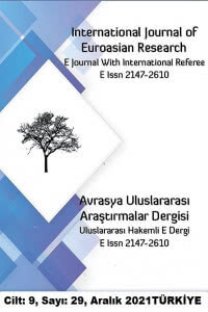TRACES OF POST-STRUCTURALIST FEMINISM IN LOCHHEAD’S BLOOD AND ICE
TRACES OF POST-STRUCTURALIST FEMINISM IN LOCHHEAD’S BLOOD AND ICE
écriture féminine, Héléne Cixous Contemporary British theatre, poststructuralist feminism,
___
- Aston, Elaine, & Reinelt, Janelle. (Eds.). 2000. The Cambridge companion to modern British women playwrights. Cambridge University Press.
- Blyth, Ian. 2004. Hélène Cixous: Live Theory. A&C Black.
- Brown, Ian. (Ed.). 2011. Edinburgh companion to Scottish drama. Edinburgh University Press.
- Calle-Gruber, Mireille & Cixous, Héléne. 2012. Hélène Cixous, Rootprints: Memory and Life Writing. Routledge.
- Christianson, Aileen, & Lumsden, Alison. 2019. Contemporary Scottish women writers. Edinburgh University Press.
- Cixous, Hélène, “The Laugh of the Medusa.” Signs 1.4 (1976): 875-893
- Cixous, Héléne, & Clément, Catherine. 1986. “The Newly Born Woman” (B. Wing, Trans.). Theory and History of Literature, Volume 24, pp. MN: University of Minneapolis.
- Cixous, Héléne. 1991. "Coming to Writing" and Other Essays. Harvard University Press.
- Crawford, Amy S. 2006. “Dis/Eruption: Hélène Cixous’s écriture féminine and the rhetoric of material idealism”. Feminismo/s. N. 7 (jun. 2006); pp. 41-56.
- Culler, Jonathan. 2007. On deconstruction: Theory and criticism after structuralism. Cornell University Press.
- Gifford, Douglas. (Ed.). 2020. History of Scottish Women's Writing. Edinburgh University Press.
- Griffiths, Trevor. R., & Llewellyn-Jones, Margaret. 1993. British and Irish Women Dramatists Since 1958 a Critical Handbook.
- Harvie, Jennifer, and Jan McDonald. 2013. “Putting New Twists to Old Stories: Feminism and Lochhead’s Drama.” Liz Lochhead’s Voices. Eds. Robert Crawford and Anne Varty. Edinburgh: Edinburgh UP, 2013. 124-147.
- ISSN: 2147-2610
- Yayın Aralığı: 4
- Başlangıç: 2012
- Yayıncı: Kürşat Öncül
MUSA DAĞ ERMENİLERİ, 1915–1939: BİR AYAKLANMA VE KAÇIŞ HİKAYESİ
2002 TÜRKİYE GENEL SEÇİM AFİŞLERİNE YÖNELİK GÖSTERGEBİLİM ANALİZİ*
EĞİTİM SOSYOLOJİSİ PERSPEKTİFİNDE EĞİTİMİN İŞLEVİ VE SOSYAL DEĞİŞME ÜZERİNE NİTEL BİR ARAŞTIRMA
VATAN GAZETESİNE GÖRE 1894 BİTLİS’TEKİ GAYRİMÜSLİM AHALİNİN ASAYİŞİNE DAİR BİR DEĞERLENDİRME
PARİS BARIŞ KONFERANSI’NDAN SAN REMO KONFERANSI’NA PETROL MESELESİ
FENİKE SİKKELERİNİN TARİHSEL ÖNEMİ ÜZERİNE BİR DEĞERLENDİRME
MARTIYA UÇMAYI ÖĞRETEN KEDİ BAŞLIKLI ÇOCUK KİTABINA EKOELEŞTİREL BİR BAKIŞ
ÇOBANLIĞIN DİJİTAL DÖNÜŞÜMÜ: YOUTUBER ÇOBAN ORHUN TOPKAYA
Aslı BÜYÜKOKUTAN TÖRET, Zülal SÖĞÜT
Tawfik Abdo Taher AL-SHARABI, Yılmaz YEŞİL
SANAL-DİJİTAL KÜLTÜR ORTAMINDA YEREL İMGESİ: YOUTUBE ÖRNEKLEMİ
